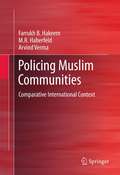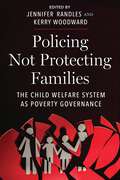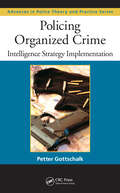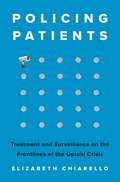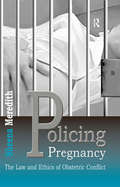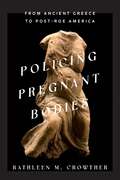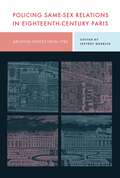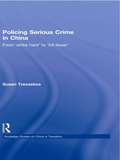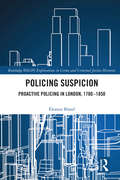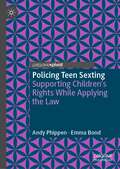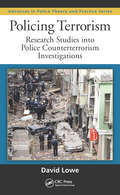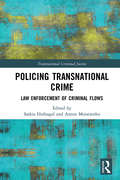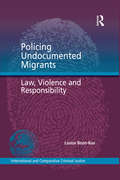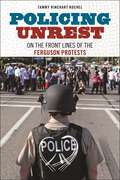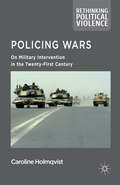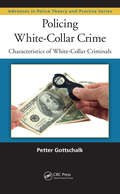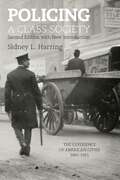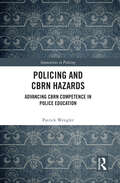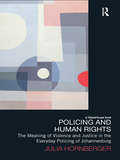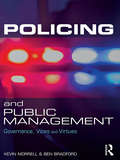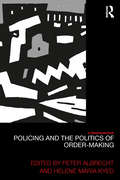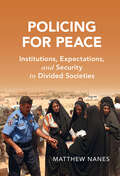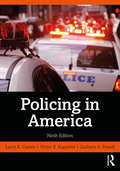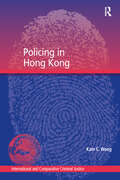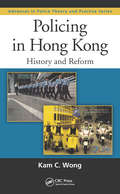- Table View
- List View
Policing Muslim Communities
by M. R. Haberfeld Farrukh B. Hakeem Arvind VermaIn the past two decades, Muslim countries across the globe have been faced with a crisis in governance. Starting with a summary of Islamic Law (Sharia) and its implications for law enforcement, this book will highlight the unique needs and challenges of law enforcement, and particularly policing, in these communities. It will provide a scholarly exposition of Sharia law and how it is compatible (or not) with policing in a modern context. The role and contribution of Sharia Law towards conceptualizing law enforcement in a modern context is certainly worth looking forward to, especially understanding its co-existence with civil law in countries with minority Muslim communities. Featuring case studies from throughout the Muslim world, this volume will highlight key qualities of Sharia law and Muslim culture that play a role in law enforcement, including: case processing, community policing, police administration, human rights, and the influence of globalization. Taking a comprehensive approach, this work provides a historical context for colonization events in Muslim countries and their influence on current law enforcement systems, as well as providing key insights into the particular norms that make up the bases for Muslim societies, and their unique needs. Looking into the future, it provides guidelines for how community policing can play a proactive role in law enforcement and crime prevention.
Policing Not Protecting Families: The Child Welfare System as Poverty Governance (Critical Perspectives on Youth)
by Jennifer Randles Kerry WoodwardControlling, surveilling, and punishing poor families through the child welfare systemIn a typical year, one in five US children have some interaction with the child welfare system. Countless other families, particularly those who struggle to care for their children due to poverty or economic insecurity, fear child welfare system involvement. Though imagined as a system that protects children from caregivers’ maltreatment, contributors to Policing Not Protecting Families argue that the child welfare system polices and punishes poor parents who are unable to meet white, middle class parenting standards due to structural inequalities.Bringing together scholars from anthropology, sociology, law, and social work, this collection is the first to critically examine the child welfare system’s role in governing poor, disproportionately Black and Native families. It shows that the child welfare system is a key site of poverty governance, or state control and management of poor families. Chapters bring together empirical research from diverse settings across the US, highlighting the system’s interactions with other state systems and its wide impact on marginalized families. Together the chapters illustrate the failure of the child welfare system to protect children and families from the structural inequalities that shape the lives of poor and other marginalized families.
Policing Organized Crime: Intelligence Strategy Implementation (Advances in Police Theory and Practice)
by Petter GottschalkWhen criminal activity is as straightforward as a childs game of cops and robbers, the role of the police is obvious, but today‘s bad guys don‘t always wear black. In fact, the most difficult criminals to cope with are those who straddle the gray divide between licit and illicit activity. Many of these nefarious sorts operate on the fringe of soci
Policing Patients: Treatment and Surveillance on the Frontlines of the Opioid Crisis
by Elizabeth ChiarelloA book that takes you inside the culture of surveillance that pits healthcare providers against their patientsDoctors and pharmacists make critical decisions every day about whether to dispense opioids that alleviate pain but fuel addiction. Faced with a drug crisis that has already claimed more than a million lives, legislatures, courts, and policymakers have enlisted the help of technology in the hopes of curtailing prescriptions and preventing deaths. This book reveals how this &“Trojan horse&” technology embeds the logics of surveillance in the practice of medicine, forcing care providers to police their patients while undermining public trust and doing untold damage to those at risk.Elizabeth Chiarello draws on hundreds of in-depth interviews with physicians, pharmacists, and enforcement agents across the United States to take readers to the frontlines of the opioid crisis, where medical providers must make difficult choices between treating and punishing the people in their care. States now employ prescription drug monitoring programs capable of tracking all controlled substances within a state and across state lines. Chiarello describes how the reliance on these databases blurs the line between medicine and criminal justice and pits pain sufferers against people with substance-use disorders in a zero-sum game.Shedding critical light on this brave new world of healthcare, Policing Patients urges medical providers to reaffirm their roles as healers and proposes invaluable policy solutions centered on treatment, prevention, and harm reduction.
Policing Pregnancy: The Law and Ethics of Obstetric Conflict
by Sheena MeredithAre pregnant women entitled to the same rights of self-determination and bodily integrity as other adults? This is the fundamental question underlying recent high-profile legal interventions in situations when pregnant women and healthcare staff do not agree on management options or appropriate behaviour. Courts on both sides of the Atlantic have sometimes answered that they are not, and the law has at times been manipulated to enforce compliance with medical recommendations. This is the first book of its kind to offer a comprehensive assessment of healthcare law as applied to the unique situation of pregnancy. Drawing on case material from both the UK and the USA, it describes the trend towards 'policing pregnancy' and explores the emergence of the concept of 'maternal-foetal conflict' - and why, in the author's view, this would be more appropriately labelled 'obstetric conflict'. Suggestions are made for alternative approaches that better safeguard the overall well-being of pregnant women and their future children.
Policing Same-Sex Relations in Eighteenth-Century Paris: Archival Voices from 1785
by Jeffrey MerrickPolice in Paris arrested thousands of men for sodomy or similar acts in the eighteenth century. In the mid-1780s, they recorded depositions in which prisoners recounted their own sexual histories. These remarkable documents, curated and translated into English by Jeffrey Merrick, allow us to hear the voices of men who desired men and to explore complex questions about sources, patterns, and meanings in the history of sexuality.This volume centers on two cartons of paperwork from commissaire Charles Convers Desormeaux. Dated from 1785, the cartons contain 221 dossiers of men arrested for sodomy or similar acts in Paris. Merrick translates and annotates the police interviews from these dossiers, revealing how the police and those they arrested understood sex between men at the time. Merrick discusses the implications of what the men said (and what they did not say), how they said it, and in what contexts it was said.The best-known works of clergy and jurists, of enemies and advocates of Enlightenment, and of novelists and satirists from the eighteenth century tell us nothing at all about the lived experience of men who desired men. In these police dossiers, Merrick allows them to speak in their own words. This primary text brings together a wealth of important information that will appeal to scholars, students, and general readers interested in the history of sexuality, sodomy, and sexual policing.
Policing Serious Crime in China: From 'Strike Hard' to 'Kill Fewer' (Routledge Studies on China in Transition)
by Susan TrevaskesDespite a resurgence in the number of studies of Chinese social control over the past decade or so, no sustained work in English has detailed the recent developments in policy and practice against serious crime, despite international recognition that Chinese policing of serious crime is relatively severe and that more people are executed for crime in China each year than in the rest of the world combined. In this book the author skilfully explores the politics, practice, procedures, and public perceptions of policing serious crime in China, focusing on one particular criminal justice practice – anti-crime campaigns – in the period of transition from planned to market economy from the 1980s to the first years of the twenty-first century. Susan Trevaskes analyzes the elements that led to the Hard Strike becoming the preferred method of attacking the growing problem of serious crime in China before going on to examine the factors surrounding the failure of the Hard Strike as a way of addressing the main problems of serious crime in China today, that is drug trafficking and organized crime . Drawing on a rich variety of Chinese sources Serious Crime in China is an original and informed read for scholars of China, criminologists generally and the international human rights community.
Policing Suspicion: Proactive Policing in London, 1780-1850 (Routledge SOLON Explorations in Crime and Criminal Justice Histories)
by Eleanor BlandPolicing Suspicion is an innovative examination of policing practices and the impact of these on patterns of arrest and prosecution in London, 1780-1850. The work establishes and defines the idea of 'proactive policing' in historical context: where police officers exercised discretion to arrest defendants on suspicion that they had recently committed, or were about to commit, an offence. Through detailed examination of primary sources, including the Old Bailey Proceedings, newspaper reports, instructions for police officers, archival records of policing practices and Select Committee reports, the book examines the reasons given for arrests, and the characteristics of those arrested. Suggesting that individual police officers made active choices using their discretion, the book highlights how policing practices affected the received record of criminal activity. It also explores continuities and changes in policing practices before and after the establishment of the Metropolitan Police force in 1829, examining the expectations placed on the various officials responsible for law enforcement. The book contends that policing practices, and proactive officers themselves, contributed to the prevalence of criminal stereotypes. Beyond the historical, the book is situated within criminological frameworks around policing and preventive justice, noting parallels between historical policing based on suspicion and contemporary police powers such as stop and search. Speaking to issues of wider significance for criminologists by examining interactions between the police and suspects, and reflecting on police decision making processes, the book offers an original approach to those researching both the history of crime and policing, and criminology and criminal justice more broadly.
Policing Teen Sexting: Supporting Children’s Rights While Applying the Law (Palgrave's Critical Policing Studies)
by Andy Phippen Emma BondThis book explores the policing response to teen sexting – the digital exchange, both consensual and non-consensual, of intimate images among youth peers. With a particular focus in England and Wales, it also considers other international responses and the challenges faced in policing youth practices with legislation being applied beyond its intended scope. It uses the police responses in England and Wales as a case study of the challenges of policy evolving the digital cultural phenomenon and the tensions between enforcing the law, while knowing it’s not fit for purpose, and supporting vulnerable minors. It explores the policy responses that have developed from the problematic legislation and whether these policy interventions have helped or hindered the policing process. It draws in parallels with drugs policy and policing, and brings in progressive, harm reduction approaches in contrast to traditional solutions.
Policing Terrorism: Research Studies into Police Counterterrorism Investigations (Advances in Police Theory and Practice)
by David LoweBased primarily upon information from the UK Special Branch Counterterrorism Unit, Policing Terrorism: Research Studies into Police Counterterrorism Investigations takes you through the mechanics of a counterterrorism investigation. A combination of legal and empirical research, this entry in the Advances in Police Theory and Practice book series e
Policing Transnational Crime: Law Enforcement of Criminal Flows (Transnational Criminal Justice)
by Saskia HufnagelAs the threats posed by organised crime and terrorism persist, law enforcement authorities remain under pressure to suppress the movement, or flows, of people and objects that are deemed dangerous. This collection provides a broad overview of the challenges and trends of the policing of flows. How these threats are constructed and addressed by governments and law enforcement agencies is the unifying thread of the book. The concept of flows is interpreted broadly so as to include the trafficking of illicit substances, trade in antiquities, and legal and illegal migration, including cross-border travel by members of organised crime groups or ‘foreign fighters’. The book focuses especially on the responses of governments and law enforcement agencies to the changing nature and intensity of flows. The contributors comprise a mix of lawyers, sociologists, historians and criminologists who address both formal legal and practical, on-the-ground approaches to the policing of flows. The volume invites reflection on whether the existing tool kit of governments and law enforcement agencies is adequate in this changing environment and how it could be modernised, for example, by increased reliance on technology or by reappraising the role of the private sector. As such, the book will be useful not only for academics and practitioners who work on security-related matters, but also more generally to those who are interested in what the near-term future of policing is likely to look like and how the balance between law enforcement on the one hand and human rights and civil liberties on the other can be achieved.
Policing Undocumented Migrants: Law, Violence and Responsibility (International and Comparative Criminal Justice)
by Louise Boon-KuoMigration policing experiments such as boat turn-backs and offshore refugee processing have been criticised as unlawful and have been characterised as exceptional. Policing Undocumented Migrants explores the extraordinarily routine, powerful, and above all lawful practices engaged in policing status within state territory. This book reveals how the everyday violence of migration law is activated by making people ‘illegal’. It explains how undocumented migrants are marginalised through the broad discretion underpinning existing frameworks of legal responsibility for migration policing. Drawing on interviews with people with lived experience of undocumented status within Australia, perspectives from advocates, detailed analysis of legislation, case law and policy, this book provides an in-depth account of the experiences and legal regulation of undocumented migrants within Australia. Case studies of street policing, immigration raids, transitions in legal status such as release from immigration detention, and character based visa determination challenge conventional binaries in migration analysis between the citizen and non-citizen and between lawful and unlawful status. By showing the organised and central role of discretionary legal authority in policing status, this book proposes a new perspective through which responsibility for migration legal practices can be better understood and evaluated. Policing Undocumented Migrants will be of interest to scholars and practitioners working in the areas of criminology, criminal law, immigration law and border studies.
Policing Unrest: On the Front Lines of the Ferguson Protests
by Tammy Rinehart KochelAn up-close account of policing during the Ferguson protests, providing insights from both police officers and members of the communityPolicing Unrest presents the frontline experiences of police officers during the intense three weeks of protest, vigils, looting, violence, and large civil demonstrations in and around Ferguson, Missouri, following the fatal shooting of Michael Brown by a police officer. Looking closely at the lived experiences of police officers and community residents, Tammy Rinehart Kochel raises important questions about police-community relations and the role of police as peacekeepers in support of social justice.Drawing on interviews with dozens of police personnel who policed the protests, Kochel offers insight into their shared experiences and provides compelling personal accounts of how they performed their jobs during the protest. The book covers a range of topics such as police-community relationships and community policing principles; how factors such as police subculture and organizational culture stacked up against social identity during this crisis; the role of an officer’s characteristics, especially an officer’s race, play in an officer’s self-legitimacy; and the implications for police recruitment and training. Kochel’s unique access allowed her to provide a balanced perspective on police officers’ cynicism and public protests against police that were rampant in the year following Ferguson against the need to restore police-community relations and police legitimacy through increased transparency, accountability, and procedural justice. Policing Unrest explains how the Ferguson protests ushered in an era of police reform and reveals what it is like being a police officer facing public unrest, particularly in the wake of widely publicized incidents of police brutality around the country.
Policing Wars
by Caroline HolmqvistHolmqvist presents an original account of the relationship between war and policing in the twenty first century. This interdisciplinary study of contemporary Western strategic thinking reveals how, why, and with what consequences, the wars in Afghanistan and Iraq became seen as policing wars.
Policing White-Collar Crime: Characteristics of White-Collar Criminals (Advances in Police Theory and Practice)
by Petter GottschalkCombating white-collar crime is a challenge as these criminals are found among the most powerful members of society, including politicians, business executives, and government officials. While there are many approaches to understanding this topic, Policing White-Collar Crime: Characteristics of White-Collar Criminals highlights the importance of po
Policing a Class Society: The Experience of American Cities, 1865-1915
by Sidney L. HarringPolice are popularly understood as the “thin blue line” that “serves and protects” us from violence and crime in the pursuit of justice. In Policing a Class Society, Sidney L. Harring provides an essential corrective to the ideas that police have always been around, that they are a force for deterring crime, or that theyhave an interest in the pursuit of justice. Looking at the growth of the urban police force around the turn of the 20th century, Harring argues that the police protected the interestsof manufacturers, working almost as hired guns. Rather than fighting crime, the historical role of police was to control the leisure activity of the devloping working-class and maintainthe existing order of capitalist relationships.
Policing and CBRN Hazards: Advancing CBRN Competence in Police Education (Innovations in Policing)
by Patrick WenglerThis book makes an important contribution to police scholarship by focusing on the critical need for law enforcement personnel to receive education on chemical/biological/radiological/nuclear (CBRN) hazards. Under the CBRN umbrella are chemical warfare agents, toxic industrial chemicals, biologically derived toxins, radiological particulate hazards, and other agents, any of which have the potential to inflict bodily harm, incapacitation, or death. Such weapons have been a part of human history for centuries, starting with biological warfare, later shifting over to chemical warfare, and in the last century, radiological and nuclear warfare. The greater availability and accessibility of such materials necessitates that first response and investigation is no longer limited to the military but is required of police forces reacting to incidents in the community, whether acts of terrorism, traffic accidents, or standard industrial incidents. In this book it is argued that basic knowledge of CBRN is essential for police officers at all levels to assess and protect crime scenes, as well as to investigate cases involving CBRN materials. The author uses case studies and technical education to instruct police on how and when CBRN agents can be used maliciously, and the best methods for identifying, analysing, monitoring, and investigating related incidents. The text makes a clear case for integrating CBRN studies into police education so that first responders are enabled to assess incidents and share information with emergency management and other services to determine the most effective equipment and personnel to deploy. This book is essential for police educators and trainers in both universities and police academies, those administering or engaged in in-service police training, and scholars studying policing, criminal justice, and terrorism.
Policing and Human Rights: The Meaning of Violence and Justice in the Everyday Policing of Johannesburg (Law, Development and Globalization)
by Julia HornbergerPolicing and Human Rights analyses the implementation of human rights standards, tracing them from the nodal points of their production in Geneva, through the board rooms of national police management and training facilities, to the streets of downtown Johannesburg. This book deals with how the unprecedented influence of human rights, combined with the inability by police officers to ‘live up’ to international standards, has created a range of policing and human rights vernaculars – hybrid discourses that have appropriated, transmogrified and undercut human rights. Understood as an attempt by police officers, as much as by the police as a whole, to recover a position from which to act and to judge, these vernaculars reveal the compromised ways in which human rights are – and are not – implemented. Tracing how, in South Africa, human rights have given rise to new forms of popular justice, informal ‘private’ policing and provisional security arrangements, Policing and Human Rights delivers an important analysis of how the dissemination and implementation of human rights intersects with the post-colonial and post-transformation circumstances that characterise many countries in the South.
Policing and Public Management: Governance, Vices and Virtues
by Ben Bradford Kevin MorrellPolicing and Public Management takes a new perspective on the challenges and problems facing the governance of police forces across the UK and the developed world. Complementing existing texts in criminology and police studies, Morrell and Bradford draw on ideas from the neighbouring fields of public management and virtue ethics to open the field up to a broader audience. This forms the basis for an imaginative reframing of policing as something that either enhances or diminishes "the public good" in society. The text focuses on two cross-cutting aspects of the relationship between the police and the public: public confidence and public order. Extending award-winning work in public management, and drawing on extensive and varied data sources, Policing and Public Management offers new ways of seeing the police and of understanding police governance. This text will be valuable supplementary reading for students of public management, policing and criminology, as well as others who want to be better informed about contemporary policing.
Policing and the Politics of Order-Making (Law, Development and Globalization)
by Peter Albrecht Helene Maria KyedThis anthology explores the political nature of making order through policing activities in densely populated spaces across Africa, Asia and Latin America. Based on ethnographic research, the chapters analyze this complex with respect to marginalized young men in Haiti, community policing members and national politicians in Swaziland as well as other individual and collective actors engaged in policing and politics in Indonesia, Swaziland, Ghana, South Africa, Mexico, Bolivia, Haiti and Sierra Leone. What these contexts have in common is a plurality of order-making practices. Not one institution monopolizes the means of violence or a de facto sovereign position to do so. A number of interests are played out simultaneously, entailing re-negotiations over the very definition of what ‘order’ is. How and by whom a particular order is enforced is contested, at times violently so, and is therefore inherently political. In the existing literature on weak states, legal pluralism and policing in the Global South it is seldom made explicit that making order is a route to power and positions of political decision-making. It is this gap in the literature that this anthology fills, as it analyses the politics at stake in processes of order-making.
Policing for Peace: Institutions, Expectations, and Security in Divided Societies (Cambridge Studies in Law and Society)
by Matthew NanesIn communities plagued by conflict along ethnic, racial, and religious lines, how does the representation of previously-marginalized groups in the police affect crime and security? Drawing on new evidence from policing in Iraq and Israel, Policing for Peace shows that an inclusive police force provides better services and reduces conflict, but not in the ways we might assume. Including members of marginalized groups in the police improves civilians' expectations of how the police and government will treat them, both now and in the future. These expectations are enhanced when officers are organized into mixed rather than homogeneous patrols. Iraqis indicate feeling most secure when policed by mixed officers, even more secure than they feel when policed by members of their own group. In Israel, increases in police officer diversity are associated with lower crime victimization for both Arab and Jewish citizens. In many cases, inclusive policing benefits all citizens, not just those from marginalized groups.
Policing in America
by Victor E. Kappeler Larry K. Gaines Zachary A. PowellPolicing in America, Ninth Edition, provides a thorough analysis of the key issues in policing today, and offers an issues-oriented discussion focusing on critical concerns such as personnel systems, organization and management, operations, discretion, use of force, culture and behavior, ethics and deviance, civil liability, and police-community relations. In the field of law enforcement in the United States, it is essential to know the contemporary problems being faced and combine that knowledge with empirical research and theoretical reasoning to arrive at best practices and an understanding of policing. The text opens with a critical assessment of police history and the role politics played in the development of American police institutions and concludes with consideration of such contemporary issues as globalization, terrorism, and homeland security. Appropriate for introductory policing courses, this new edition not only offers updated research and examples, it also incorporates ways for the reader to connect to the content through learning objectives, discussion questions, and "Myths and Realities of Policing" boxes. Video and Internet links provide additional coverage of important issues. With completely revised and updated chapters, Policing in America, Ninth Edition, provides an up-to-date examination of what to expect as a police officer in America.
Policing in Hong Kong: History And Reform (International and Comparative Criminal Justice)
by Kam C. WongThis book is one of the first to document the challenges and opportunities facing the Hong Kong police force following the reversion of political authority from the UK to China in 1997. Thematically organized and oriented towards those issues of greatest concern to the public, such as police accountability, assaults on police, police deployment, surveillance powers, and policing across borders, it provides a detailed discussion of these and other contemporary issues. The opening chapter sets the work within historical context while the final chapter provides a comparison of policing in Hong Kong with public security in the PRC. The book will be of value to students and researchers working in the area of comparative policing, and comparative criminal justice, as well as police professionals, and policy-makers.
Policing in Hong Kong: History and Reform (Advances in Police Theory and Practice)
by Kam C. WongThe HKP (Hong Kong Police),Asia‘s Finest is a battle-tested professional organization with strong leadership, competent staff, and deep culture. It is also a continuously learning and reforming agency in pursuit of organisational excellence. Policing in Hong Kong: History and Reform is the first and only book on the development of the Hong Kong
